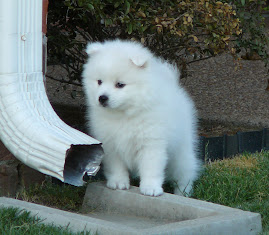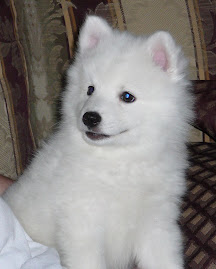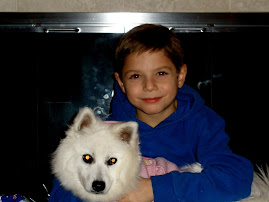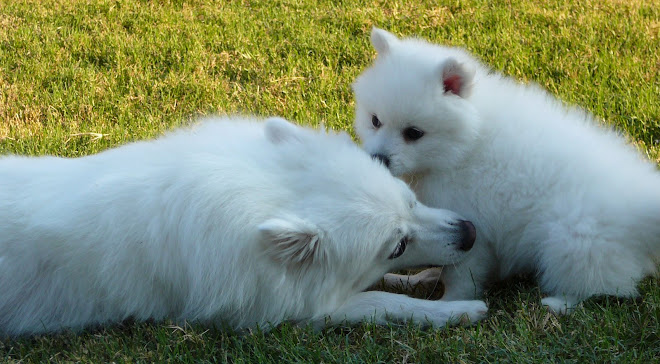 October 30, 2009
October 30, 2009 Pop quiz . . . Which holiday finds more pets straying or dying than any other holiday? According to Liam Crowe, the CEO of Bark Busters USA and dog behaviorist, the answer is Halloween. Yikes! Well, thanks to Bark Buster of Dogster's Dog Blog, here are ten tips that will help to ensure a safe Halloween for your furry little ghosts and goblins:
1. Don’t leave your dog outside. Even if you have a fenced yard, bring your dog inside where it is safe. If your dog is usually kept outside, bring him in a few times before the big night to get him used to being indoors. Your dog may be used to strangers, but so many little kids in costumes running about may be too much. Remember also that it is a natural instinct for dogs to protect the family from strangers, and on Halloween there will be no shortage of strangers.
2. Keep your dog restrained. If your dog is timid or scared, or if he tends to love people a little too much, it is best to put him in a separate room away from the front door to limit his excitability, aggression, and chance of running outside and becoming lost.
3. Reassure your dog. The best thing you can do for your dog when he is feeling unsettled by Halloween activities is to act as you normally would. By over-reassuring your dog or giving him an unusual amount of attention, you inadvertently can communicate to him that because you are acting differently, there must be something to worry about.
4. Have your dog get used to costumes. Your dog may see his family members as strangers once they don their Halloween costumes. Before the kids put them on, allow your dog to scent the costumes. If your costume has a mask, keep the mask off when you are with your dog because dogs can become confused when they can't see our faces.
3. Reassure your dog. The best thing you can do for your dog when he is feeling unsettled by Halloween activities is to act as you normally would. By over-reassuring your dog or giving him an unusual amount of attention, you inadvertently can communicate to him that because you are acting differently, there must be something to worry about.
4. Have your dog get used to costumes. Your dog may see his family members as strangers once they don their Halloween costumes. Before the kids put them on, allow your dog to scent the costumes. If your costume has a mask, keep the mask off when you are with your dog because dogs can become confused when they can't see our faces.
5. Check your dog’s ID tag. Be sure identification tags are secure on your dog’s collar-just in case.
6. Keep candy away from your dog. Many candies-especially chocolate-are toxic to dogs. The severity of the toxicity depends greatly on factors such as breed, age, size, and how much candy was ingested. Problems may range from a mild upset tummy to vomiting and diarrhea, or even death. If you have any concerns at all, consult with a veterinarian immediately. If you want to keep your dog safe, make certain that sweets, including their wrappers, are kept well away from your dog.
7. Protect dogs from candles and pumpkins. Excited or agitated dogs can easily knock over a lit candle or pumpkin. Be sure those items are away from your dog’s reach, or consider a battery-powered candle that does not burn.
8. Think twice about dressing your dog in a costume. While some dogs might enjoy being dressed up, many don’t. Experiment first to see if your dog likes being in a costume. If so, fine-he’ll most likely enjoy himself and the extra attention it brings. However, if he shows any resistance, don’t do it. Dogs feel enough stress around Halloween without also having to endure the discomfort and peculiarity of wearing a strange costume.
7. Protect dogs from candles and pumpkins. Excited or agitated dogs can easily knock over a lit candle or pumpkin. Be sure those items are away from your dog’s reach, or consider a battery-powered candle that does not burn.
8. Think twice about dressing your dog in a costume. While some dogs might enjoy being dressed up, many don’t. Experiment first to see if your dog likes being in a costume. If so, fine-he’ll most likely enjoy himself and the extra attention it brings. However, if he shows any resistance, don’t do it. Dogs feel enough stress around Halloween without also having to endure the discomfort and peculiarity of wearing a strange costume.
9. Be prepared. If you take your dog with you while trick-or-treating, be prepared at all times. Do not let your dog approach the door of a house, and stay clear of possible gags or gangs of goblins who will gather at the door. Dogs do not understand that the person jumping out at you will not hurt you; they often think they can only help you by acting aggressively. Neither children nor adults in costumes should approach a dog without the owner’s consent.
10. Have fun but think of your dog’s safety. Finally, if you want your dog to be included in Halloween festivities, think about his safety much as you would the safety of a small child. Your dog does not understand Halloween, so he needs you to provide the guidance and safety that you always do.
10. Have fun but think of your dog’s safety. Finally, if you want your dog to be included in Halloween festivities, think about his safety much as you would the safety of a small child. Your dog does not understand Halloween, so he needs you to provide the guidance and safety that you always do.












